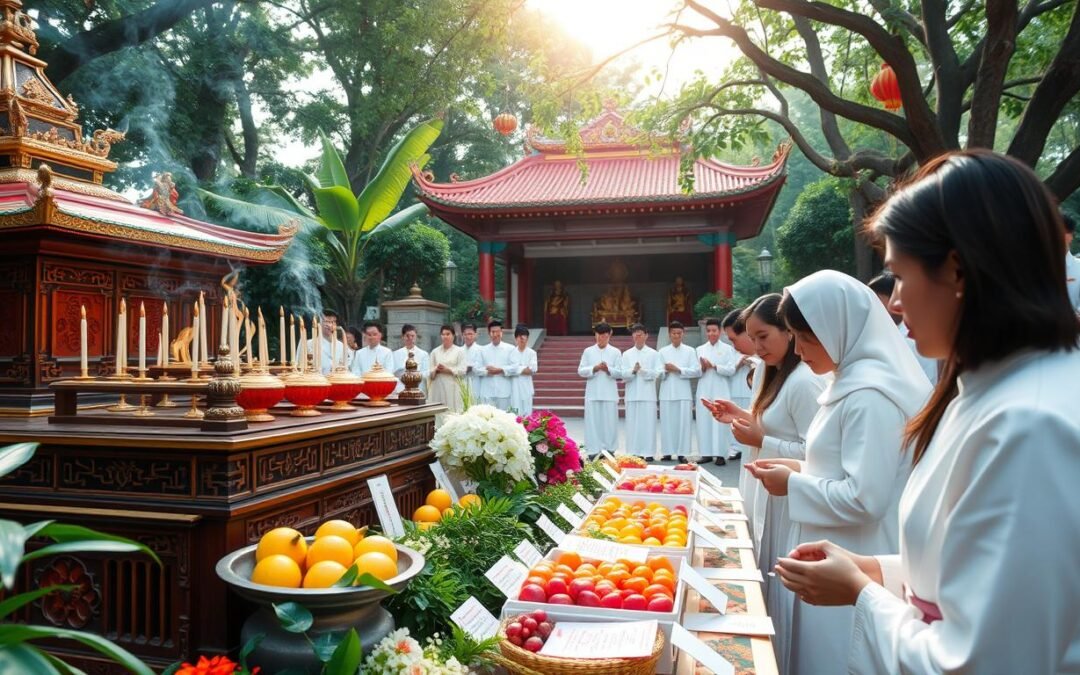Taoist funerals are a big part of Singapore’s culture, mainly in the Chinese community. They are more than just a goodbye; they are a way to honor the person who has passed away. Harmony Funeral Care has kept these traditions alive for over 60 years, showing the community’s values.
These funerals usually last for an odd number of days, like 3, 5, or 7. Different dialect groups, such as Hokkien and Cantonese, have their own customs. Families can find affordable funeral packages to help them through this tough time.
The rituals of Taoist services aim to bless the spirits of the deceased. They ensure a smooth journey to the afterlife. The traditional clothes, known as 寿衣 (Shou Yi), and the funeral practices show love and respect. Every detail is important in honoring life and death in Singaporean Taoism.
Understanding Taoist Funerals
Taoist funerals are big cultural events in the Chinese community in Singapore. They are a way to say goodbye to the deceased, bringing families and friends together. These ceremonies are based on the belief of filial piety, showing respect for ancestors.
During these events, special rituals take place. Taoist priests lead the group in chanting and performing rites for spiritual protection. For example, a priest circles a fire with nine tiles, breaking each one with a sword. This act helps the soul move on from the underworld, showing the deep connection between life, death, and the afterlife in Taoism.
Guests are also involved in the rituals. They burn joss paper money and luxury items made from it, believed to help the deceased in the afterlife. It’s important to note that there are customs to follow, like not staring at the coffin when it’s being closed.
Actions like affixing papers to the coffin and placing it outside while prayers continue add meaning to the ceremonies. The clothes the deceased wear, called 寿衣, have seven layers, showing age and family ties. Understanding these practices helps us see the cultural and spiritual depth of Taoist funerals.
| Ritual | Actions Involved | Significance |
|---|---|---|
| Chanting | Priests chant scriptures | Offers spiritual protection |
| Breaking Tiles | Priest circles fire and breaks tiles | Symbolizes freeing the soul from the underworld |
| Joss Paper Burning | Guests burn paper money and items | Provides aid to the deceased in the afterlife |
| Coffin Ritual | Coffin is closed and sealed | Respects the sacred passage of the departed |
| Attire for the Deceased | Special seven-layer garment for specific ages | Reflects lineage and respect for the dead |
Core Principles of Taoism and Death
Taoism, based on Lao Tzu’s teachings, has a unique philosophy of death. It greatly influences how we handle funerals. This ancient belief sees life as a cycle of birth, death, and rebirth. Death is not the end but a change to another form of existence.
After death, a judgment takes place, overseen by deities. This decides the soul’s next journey.
At the heart of Taoism are key principles about death. These include:
- Respect for Life: Honoring both the living and the dead is important.
- Moral Behavior: Living ethically is key, affecting the afterlife.
- Life’s Cycles: Recognizing life and death as part of existence is vital.
Taoist funerals reflect these beliefs, aiming for a smooth transition to the afterlife. In Singapore, different dialect groups like Hokkien, Teochew, Hakka, and Cantonese shape these rituals. For example, Hokkien funerals have elaborate altars and long chanting sessions. Teochew practices include burning paper effigies to help the deceased.
Reincarnation is a big part of Taoism. Many aim for immortality, not just a simple afterlife. Families show love by presenting favorite foods and burning joss sticks. These actions help believe in the deceased’s ongoing journey.
Modern Taoist funerals blend old and new traditions. Burning replicas of electronic devices as offerings is a modern twist. Taoism’s philosophy of death enriches our understanding of life and what comes next.

| Principle | Description |
|---|---|
| Respect for Life | Honoring both the living and deceased as part of the life cycle. |
| Moral Behavior | Ethical conduct impacts the deceased’s judgment in the afterlife. |
| Life’s Cycles | Recognizes the importance of birth, death, and rebirth as a continuous loop. |
| Reincarnation | Belief in the rebirth of souls, stressing the cycle of existence. |
| Immortality | Seeking eternal life, not just entering the afterlife. |
Taoist Funerals: Customs and Traditions
Taoist funeral customs deeply respect and honor the deceased. They involve rituals to guide the spirit into the afterlife. An altar is set up with offerings like fruits, joss sticks, and the departed’s portrait, welcoming their spirit.
Food offerings are key, providing nourishment for the journey. Rituals include chanting sutras and burning joss paper, symbolizing wealth in the afterlife. These ceremonies help families connect with their ancestors.
The deceased is dressed in their best, avoiding red. This shows respect for cultural values. The Hokkien community may use blessed water for purification rituals.
The funeral procession, or ‘Last Journey,’ is a key event. It involves sealing the coffin and carrying it to the crematorium. Family members participate in rituals. Attendees may sprinkle pomegranate flower water to cleanse themselves.
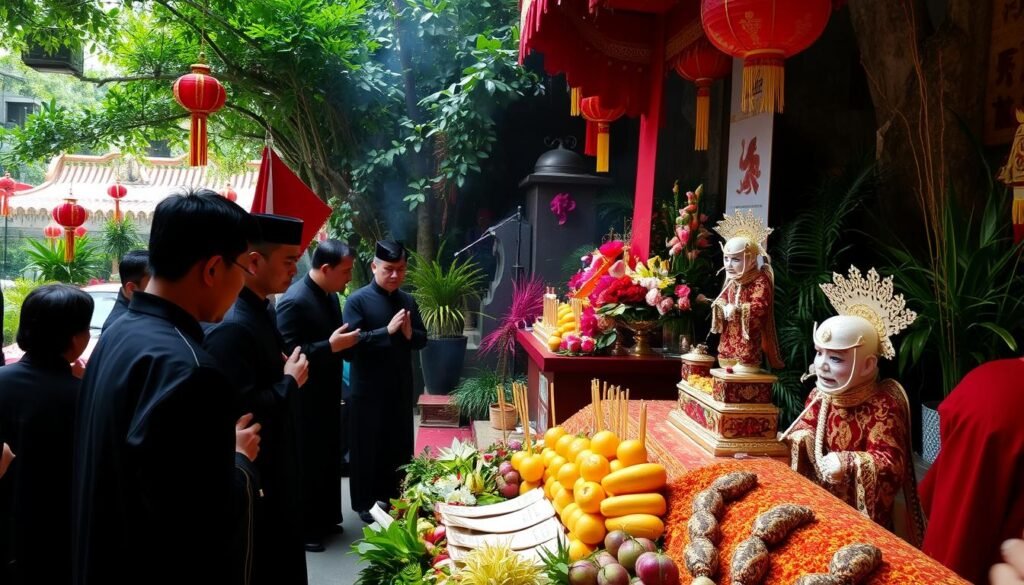
Taoist funeral customs are a mix of rituals and offerings. They guide the departed’s spirit and help families cope with grief. These traditions reflect the community’s values and beliefs about death and the afterlife.
Setting Up the Taoist Funeral Altar
The Taoist altar is a key part of the funeral setup. It shows the beliefs about moving from life to the spiritual world. At the center is a portrait of the deceased, helping family and guests remember and honor them.
The offerings around the portrait are meant to comfort and guide the deceased. They help them on their journey to the afterlife.
Common offerings include fruits, traditional dishes, incense, and joss sticks. Each item represents a wish or prayer for the deceased’s peaceful journey. Families often choose items that reflect their heritage, influenced by dialect groups like Hokkien and Teochew.
- Fruits: Symbolizing prosperity and health.
- Incense: Representing prayers and communication with the spirit world.
- Food: Nourishment for the spirit’s journey.
Guests at the funeral light joss sticks, showing respect and remembrance. The altar setup is more than practical; it connects the living with the departed. It shows the spiritual bond in Taoist beliefs.
Ritual Practices in Taoist Funerals
Taoist funeral rituals are filled with deep beliefs and practices. They vary among families and dialects. About 30% of funerals in Singapore are Taoist, showing its big role in the community.
At the heart of these rituals are prayers chanted by Taoist priests. They help lift the spirits and guide the deceased on their journey after life.
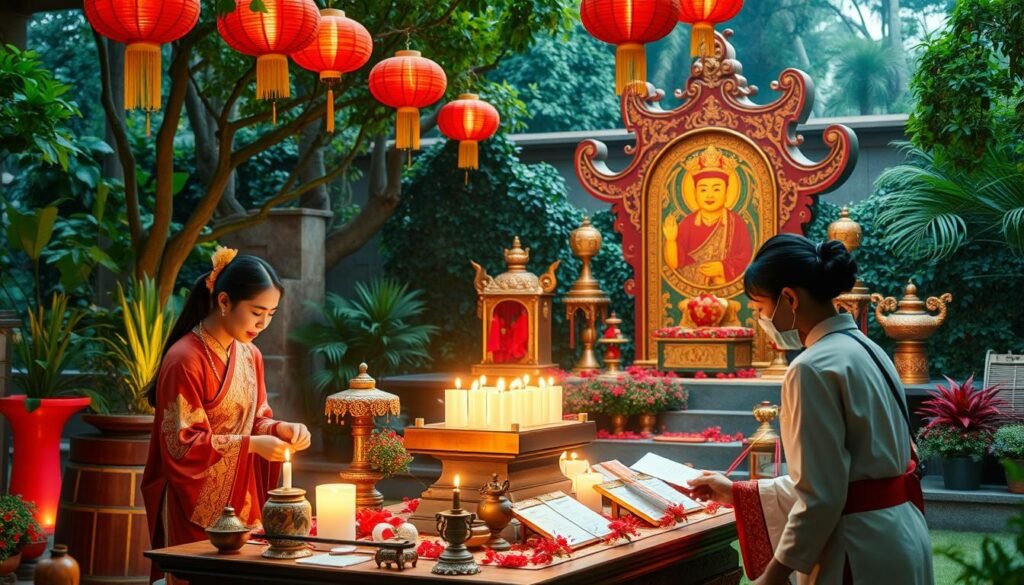
Burning paper offerings is a key part of these ceremonies. Items like joss paper and effigies are burned to help the deceased in the afterlife. Families choose 3 to 5 days for the funeral, letting everyone join in.
Even though 70% of Taoist funerals are cremations, the focus is on respect and meaning. Ritual items like incense and candles make up 20% of funeral costs, showing their importance.
These Taoist funeral rituals bring people together, giving comfort to the grieving. Many families keep annual rites to honor their loved ones, keeping traditions alive.
Taoism thrives in Singapore’s diverse society. It blends traditions, helping families cope with loss while honoring their heritage.
Taoist Funerals in Singapore: Variations by Dialect
Taoist funerals in Singapore show the rich diversity of the Chinese community. Different dialects like Cantonese, Hokkien, and Teochew have their own funeral customs. These customs are shaped by their history and culture.
Cantonese funerals include rituals like “Breaking the Hell’s Gate” to help the deceased pass safely. Teochew funerals, on the other hand, focus on agricultural offerings. This shows their deep connection to their cultural roots and the afterlife.
The colors of mourning clothes also vary, depending on the relationship to the deceased. Usually, family members wear white or black. This highlights the unique traditions of each dialect group.
Understanding these differences helps us appreciate the connection between the living and their ancestors. It shows the rich and diverse world of Taoist practices in Singapore.
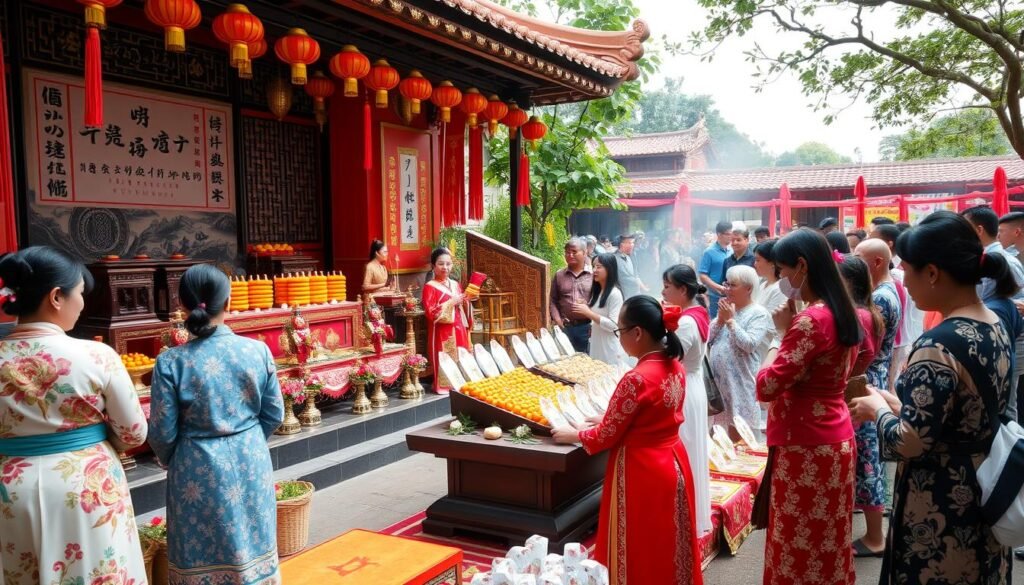
Etiquette for Attending a Taoist Funeral
Going to Taoist funerals means knowing the funeral etiquette. It shows respect for the person who passed away and their family. People should wear loose white T-shirts and black pants. This shows respect and modesty.
Family members of the deceased often wear white. This shows their close bond with the person who has passed away.
It’s important to offer condolences during the ceremony. You can bring food, fruits, flowers, incense, and hell notes. These gifts honor the deceased and help their spirits.
Also, you can give money to help with funeral costs. This is called bai jin (白金). It shows you care about the family’s well-being.
Being respectful is key. Avoid loud actions or disrespecting traditions. It’s also important not to touch the offerings. This way, you don’t interrupt the deceased’s journey.
Don’t start conversations about gossip or trends. It’s better to focus on honoring the deceased.
When you attend a Taoist funeral, show respect in rituals. Many people take a moment of silence. This is a time for personal reflection.
Looking away when the casket closes is also a tradition. It shows respect for the soul’s journey. These actions help create a respectful and honoring atmosphere.
| Aspect | Details |
|---|---|
| Attire | Loose white T-shirt and black pants for guests; white attire for immediate family. |
| Common Offerings | Food, fruits, flowers, incense, hell notes. |
| Monetary Condolences | Bai jin (白金) to cover funeral expenses. |
| Inappropriate Behavior | Loud actions or disregard for customs. |
| Respectful Practices | Avoid touching offerings; observe moments of silence. |
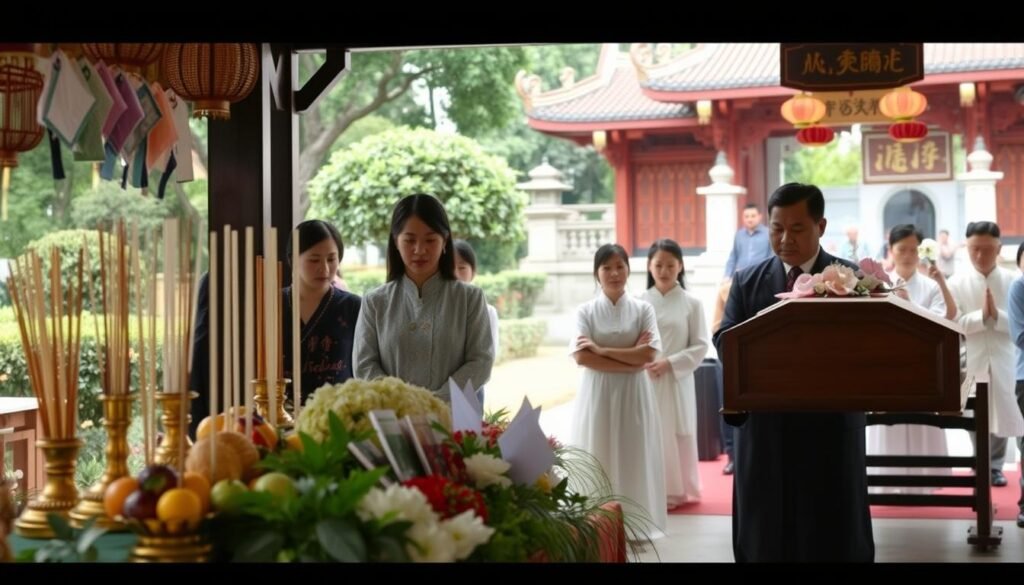
Choosing the Right Taoist Funeral Package
Choosing the right Taoist funeral package is key for families saying goodbye to their loved ones. It’s important to know the different options available. This helps families pick based on their budget and what they prefer. Funeral packages range from simple to elaborate, meeting various needs and cultural traditions.
The average cost of a Taoist funeral in Singapore is around $11,191.38. Prices can change a lot. For example, Direct Funeral Services offers a 3-day, 2-night package for $8,888 (excluding GST). Families like to know what each package includes to make sure they get everything they need.
| Package Type | Average Cost (SGD) | Included Services |
|---|---|---|
| Basic Package | $8,000 | Embalming, Handling & Encoffin Service, Wake setup, Floral Arrangement, Taoist Altar setup, Funeral procession service |
| Value Package | $14,988 (inclusive of GST) | All Basic services plus additional enhancements and a more luxurious casket option |
When choosing, think about where the wake will be. It’s usually at the deceased’s apartment or nearby. Knowing about Taoist funeral rituals, like the 49-day mourning period, helps appreciate the chosen package. Families might also want services that offer grief counseling after the funeral.
Conclusion
Taoist funerals in Singapore show a mix of tradition, respect, and spirituality. They connect past and present. Modern lifestyles have changed, but Taoist funerals have adapted, keeping their essence.
At the heart of these funerals is the 49th day, a key moment. It marks the end of important rituals for the deceased’s journey. Ceremonies now use eco-friendly offerings and electronic burners, showing respect for the environment and tradition.
Taoist priests, or Daoshi, play a big role in guiding the soul’s journey. They help with digital memorials, blending old and new. Participating in these rituals helps understand life, death, and family bonds.
FAQ
What are the key rituals involved in a Taoist funeral in Singapore?
How does filial piety influence Taoist funerals?
What is the significance of the altar at a Taoist funeral?
Are there different customs based on dialect groups at Taoist funerals?
What etiquette should attendees follow at a Taoist funeral?
How can families choose the right Taoist funeral package?
What are the core principles of Taoism that relate to death?
Why is it important to understand Taoist funeral traditions in Singapore?
Source Links
- https://www.singaporefuneralservices.sg/singapore-taoist-funeral-services/
- https://embracefuneralservices.com.sg/taoist-funeral-singapore/
- https://www.singaporecasket.com.sg/planning-a-taoist-funeral-in-singapore-what-you-must-know/
- https://www.confidencefuneral.com.sg/blogs/understanding-the-overall-flow-of-a-taoist-funeral/
- https://www.funeralservicessingapore.com.sg/understanding-how-a-taoist-funeral-works-in-singapore/
- https://www.alifegrad.com/the-philosophy-of-life-and-death-in-taoism-an-introduction-to-taoist-funerals/
- https://en.wikipedia.org/wiki/Taoism_and_death
- https://www.nirvanafugui.com/taoist-funeral-services-singapore/
- https://www.funeralservicessingapore.com.sg/taoist-funeral-ceremonies-traditions-customs-and-etiquette/
- https://directfuneral.com.sg/5-faqs-on-taoist-funerals-in-singapore-you-may-be-curious-about/
- https://www.alifegrad.com/taoist-funeral-customs/
- https://www.woodlandsmemorial.sg/taoist-funeral-packages
- https://www.funeralservicessingapore.com.sg/taoist-funerals-an-overview-of-taoist-philosophy-of-life-and-death/
- https://singaporebuddhistfunerals.com/the-last-journey-duration-and-rituals-of-a-taoist-funeral-in-singapore/
- https://www.nlb.gov.sg/main/article-detail?cmsuuid=a3bfaffd-f823-4cf1-80a0-888db820bf1d
- https://memorialfuneral.com.sg/blog/chinese-funeral-singapore/
- https://www.confidencefuneral.com.sg/blogs/dos-and-donts-when-attending-a-chinese-funeral/
- https://www.angbrothersfuneral.com.sg/what-you-need-to-know-when-arranging-a-taoist-funeral-in-singapore/
- https://www.nirvanafugui.com/buddhist-funeral-etiquette/
- https://www.confidencefuneral.com.sg/blogs/taoist-funeral-rituals-what-to-expect-and-how-to-prepare/
- https://directfuneral.com.sg/our-funeral-products-services/taoist-funeral-packages/
- https://voffice.com.sg/guiding-taoist-funeral-rites-in-singapore/
- https://www.singaporefuneralservices.sg/2024/11/19/taoist-funeral-practices-a-deep-dive-into-beliefs-and-traditions/
- https://www.angbrothersfuneral.com.sg/5-important-facts-about-taoist-funeral-services/

